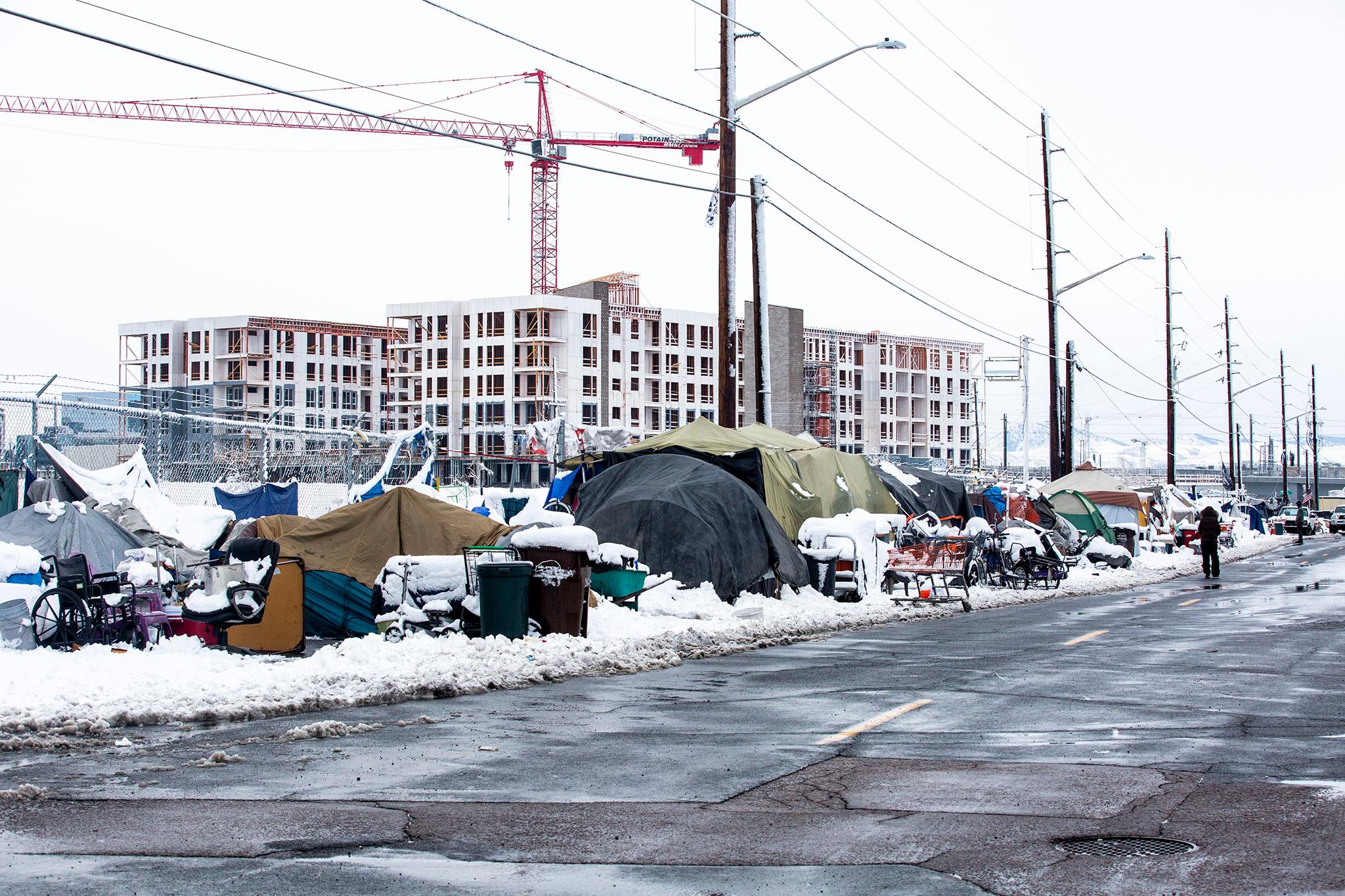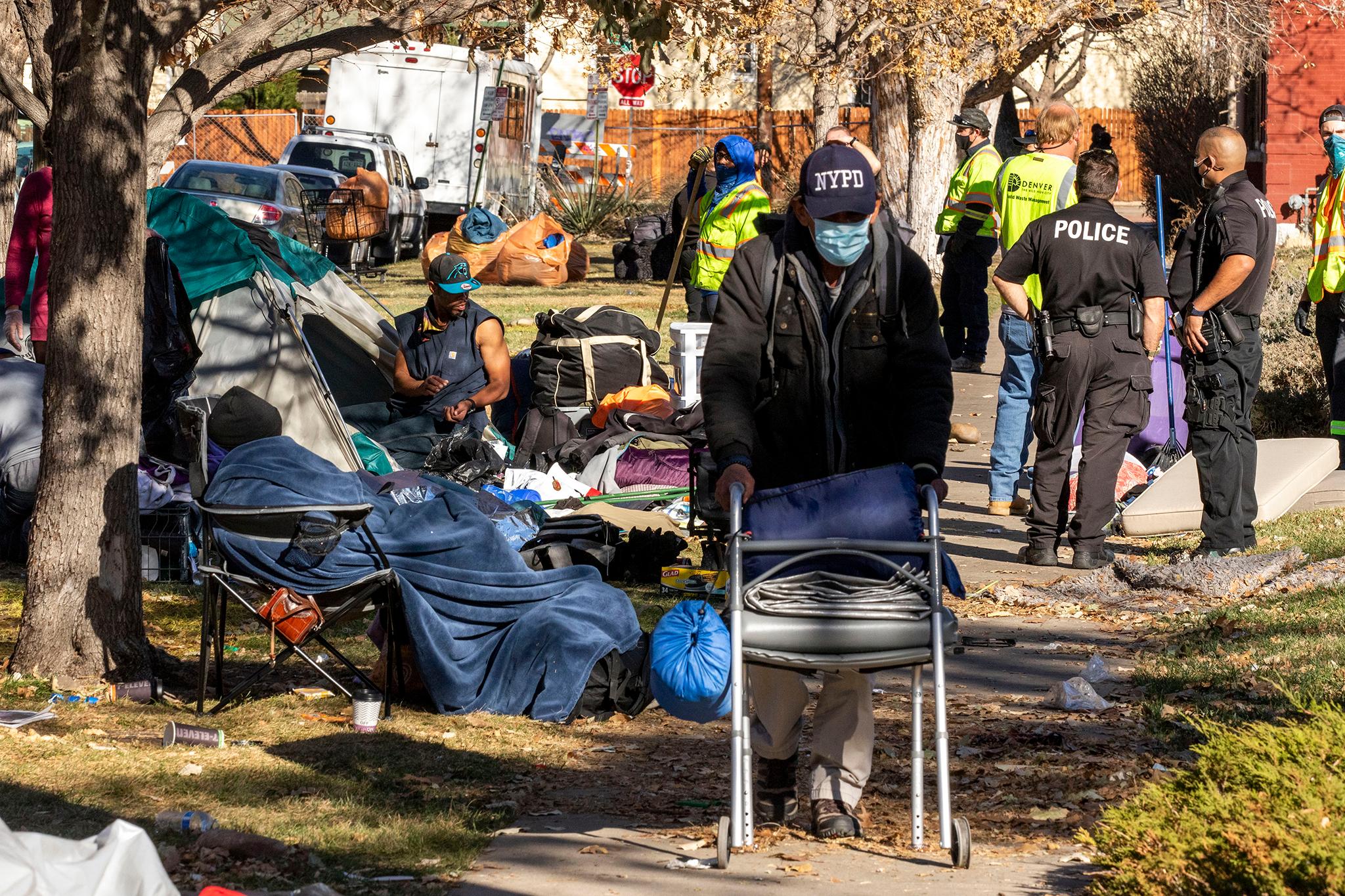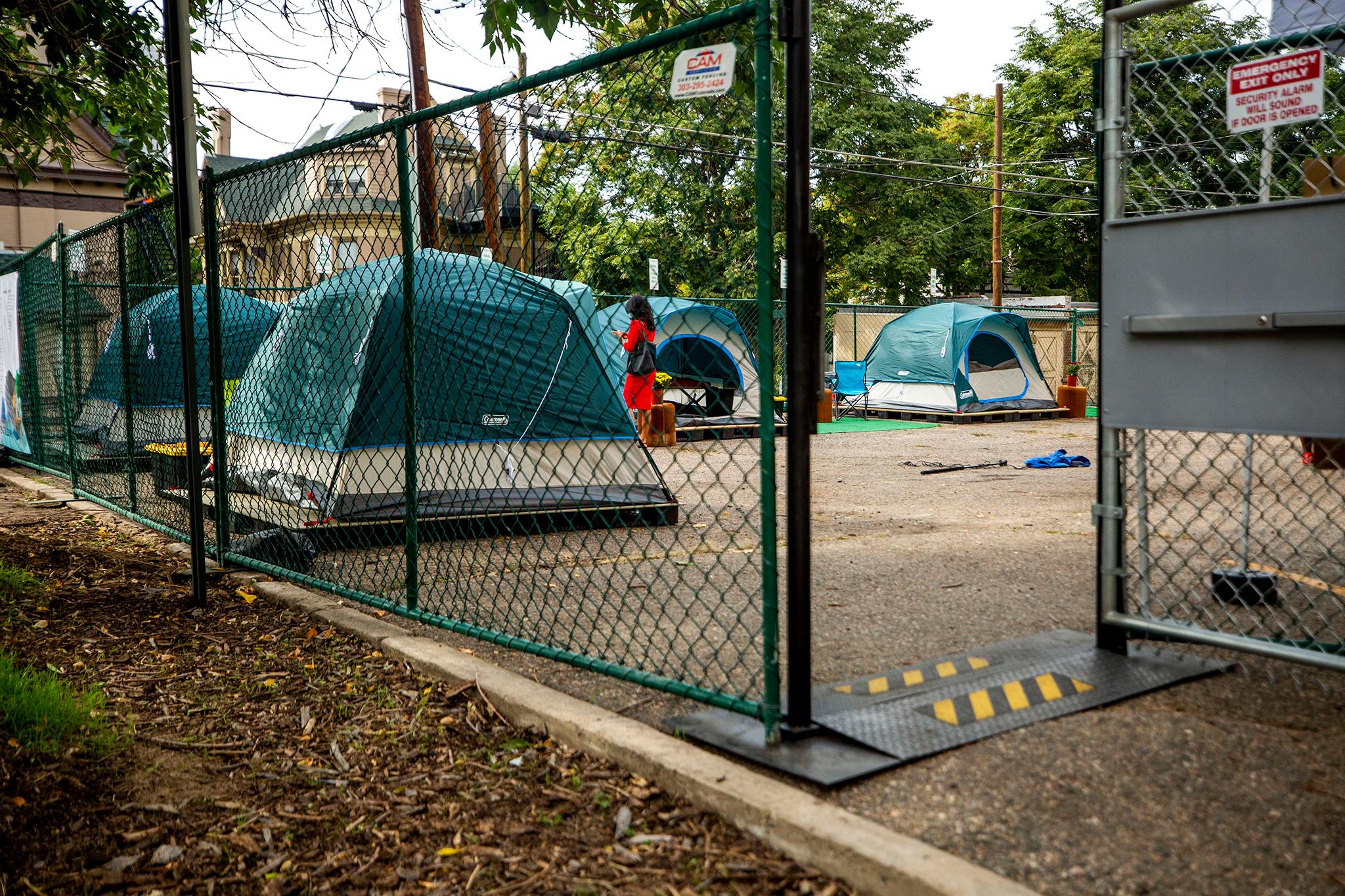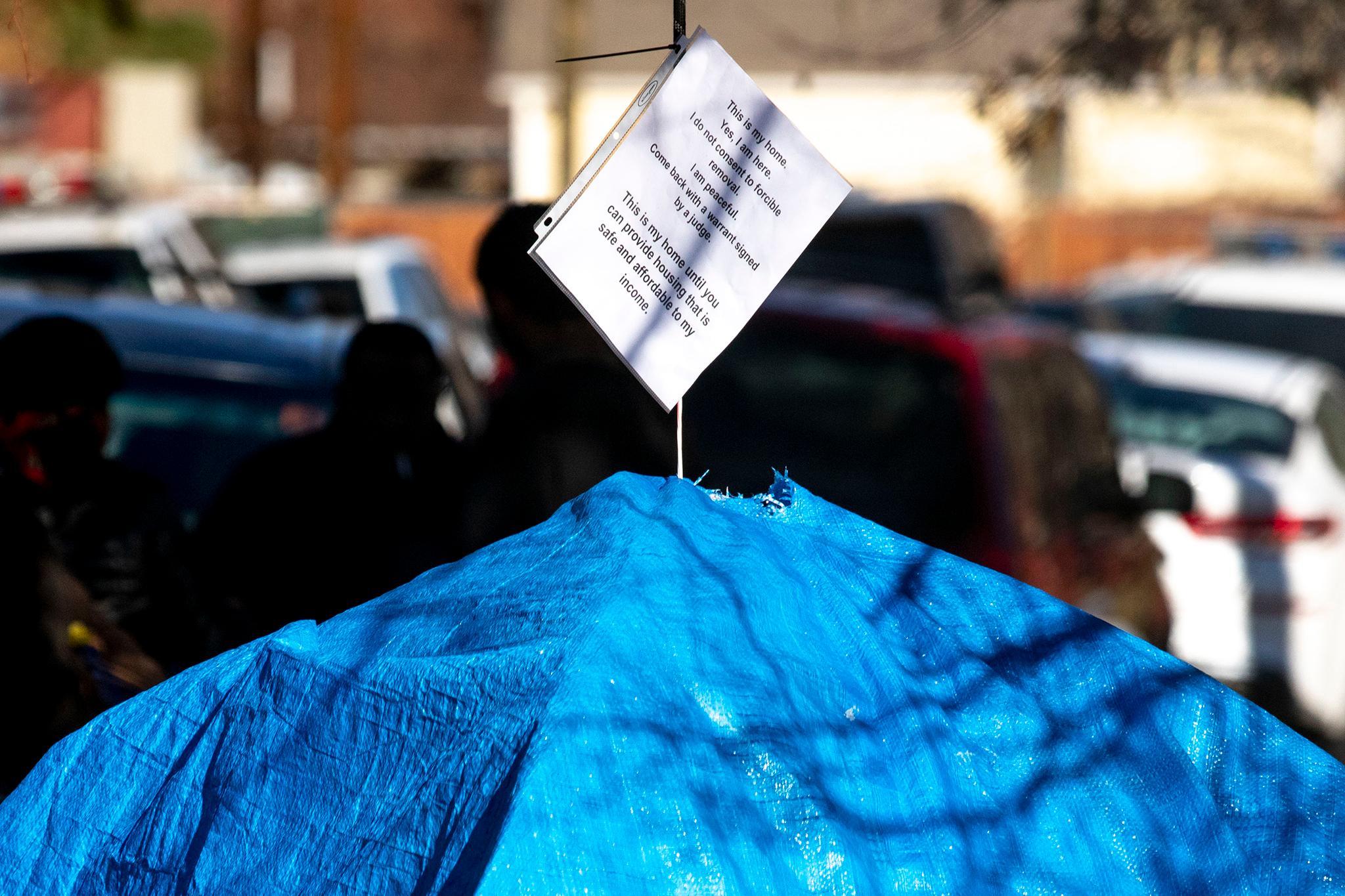When social workers visit encampments that the city plans to clear, they try to connect people living in tents and makeshift dwellings with services like shelters, counseling and housing. But a social worker might lose touch with a person experiencing homelessness in the aftermath of a cleanup operation.
As large encampments multiply in Denver, city workers conduct cleanup after cleanup that shift tent cities from one block to another, hardly a solution for either the people living on the streets or the people with houses and businesses nearby. Social workers say such sweeps can make connecting with people who need help impossible and homelessness advocates frequently protest them, calling them inhumane. The city doesn't even have clear data on whether efforts to help under such circumstances are effective.
So Denver is trying something new. It asked a homeless-service provider, the Colorado Coalition for the Homeless, to build a team comprised of a nurse and four outreach workers, including one person who has experienced homelessness, whose sole job will be to work with residents of large encampments (those with more than a half-dozen tents). For the past 15 years, the city has relied on the Colorado Coalition for the Homeless, working with two other nonprofits, the St. Francis Center and Urban Peak in a group known as the Denver Street Outreach Collaborative, to seek out people living under bridges, in parks and elsewhere outside the shelter system to offer services such as mental health counseling or help applying for benefits. The new approach, advocates hope, will give the Denver Street Outreach Collaborative a tool to target the most difficult to reach populations and hopefully connect more people with services.
"Our outreach workers have never worked in a more complex environment than large encampments," said Kevin Raleigh, who oversees outreach workers at the Colorado Coalition for the Homeless and helped design how the new team dedicated to such sites will work.

Raleigh said that in the past, a Denver Street Outreach Collaborative social worker might meet four or five people sheltering together under a bridge.
"You can really get to know that group," Raleigh said.
A Denver Street Outreach Collaborative worker might then spend months and even years checking in regularly with one person, trying to get him or her into stable housing by, for example, replacing lost identification or finding a bed in a drug treatment facility. It takes an average of two years for such a relationship to lead to stable housing, Raleigh said.
Outreach workers have found that the one-on-one approach that Denver Street Outreach Collaborative workers have used among smaller groups hasn't worked well in large camps.
"How do you have significant, meaningful conversations with 50 people, one after the other?" Raleigh said.
Elisabeth Francis, a social worker with St. Francis Center, said it is hard to give everyone in a large encampment the time it takes to get to know an individual's story and needs.
"I was at 19th and Emerson a couple of weeks before it was swept, for two-and-a-half hours," Francis said. "It felt like 30 minutes."

Before the team dedicated to large camps was formed, the city largely relied on the Denver Street Outreach Collaborative to go to large camps ahead of sweeps. Raleigh has been to those large camps and has found that "there is so much happening that you don't see unless you're there a lot."
"There's so many people I've lost (contact with) with sweeps that I've yet to see ever again," said Fatima Kiass, an outreach worker for Urban Peak, which focuses on young people experiencing homelessness.
If an outreach worker such as Kiass can no longer find a client who is forced to move when an encampment is cleared, it can mean the abrupt end to months or even years of work trying to get someone off the streets.
"I don't agree with sweeps," Kiass said. "They're not a solution."
Sweeps are usually conducted by the Department of Transportation and Infrastructure, which moves in when belongings and trash pile up to the point that people struggle to navigate the streets, creating risks to both people living in the tents and others. DOTI spokeswoman Nancy Kuhn said the department doesn't always track how much trash is collected during an encampment cleanup, but sometimes it does. For example, nearly 10 tons of trash was collected on Oct. 6 near the corner of Logan Street and 13th Avenue in Capitol Hill, part of a series of cleanups in the area that week.
That was also the week that the advocacy group Denver Homeless Out Loud and people experiencing homelessness filed a class action federal suit to try to stop sweeps, arguing that people experiencing homelessness lose belongings and are humiliated, traumatized and exposed to COVID-19 during cleanups. While that suit is still pending, another federal case ended last year with a settlement under which DOTI has to give a week's written notice before any large-scale clearance and to enact policies, including providing storage for belongings, to ensure the return of property confiscated during clearances.
The city's health department can also order sites cleared, citing such issues as "pests, litter, human feces and urine, biohazards, rotten food and trash accumulation." Health officials are not required to give notice if they deem that an encampment presents an emergency risk to public health.
Spokespeople for DOTI and Denver's police and health departments told Denverite that they don't track staff hours spent on addressing encampments, instead counting the costs as part of their normal activities. Some data on encampment cleanups can be captured, such as on Aug. 17, when an encampment near the Denver Art Museum was cleared. The housing department reported that through the efforts of outreach workers, three people living on the streets near the museum were reunited with relatives and at least one person was placed into a hotel room that day.
Britta Fisher, who heads Denver's housing department, said she's "heartened" at every instance of a person being connected with shelter or housing.
"But I always wish there were more," she said.
Last month, her department awarded the Colorado Coalition for the Homeless a three-month, $150,000 contract to lead the efforts to set up the dedicated team. Raleigh, of the coalition, said he was hopeful the three-month contract would be extended into 2021.
Members of the team dedicated to large encampments will work alongside the Denver Street Outreach Collaborative. A member of the dedicated team might, for example, find someone in a large camp who needs help securing identification or another document that he or she needs to sign a lease for an apartment. A member of the regular Denver Street Outreach Collaborative could take over such a case.
At 19th and Emerson, a day before the cleanup forced him to move, Mark Anthony Brabo said he had epilepsy and, as a result of a car accident, a bad hip. He had not been contacted by an outreach worker at the encampment.
But Brabo was already working with a St. Francis case manager to get documents together to file for disability payments he hoped would help him rent an apartment. Brabo, 55, also said he was seeing a behavioral health counselor at Denver Health to help him overcome a drug problem.
"I don't do much drugs anymore because I can't afford it," Brabo said, saying his only earnings came from begging. "My main vices right now are alcohol and cigarettes."
Brabo, who was born in the Denver area, said he last had a home in 2017, the year his mother died. He had been living with her as her caregiver, but his name was not on the lease and he had to leave when she died.
Over the last three years he has been in and out of shelters and hotel rooms. He had moved to 19th and Emerson only a week before it was scheduled to be cleared, hoping an encampment would be less stressful and crowded than shelters.
Brabo expressed uncertainty as he prepared to move ahead of the cleanup.
"All they can do is try to kick us out. And all we can do is relocate," he said. "If we have to, we'll find another place until they kick us out and we have to find another place."
As Raleigh has been thinking about how the dedicated outreach team would work, he has been reviewing a preliminary study of large encampments released by the federal Department of Housing and Urban Development last June. HUD's researchers found that rural towns, suburbs and other cities have seen a rise in encampments as homelessness has increased and housing that low- and moderate income families can afford has become less attainable. Local officials have differed in their approach, some cracking down on unsanctioned camping and others creating sanctioned sites.
"Clearance with little or no support may actually reduce the likelihood that people will seek shelter because it erodes trust and creates an adversarial relationship between people experiencing homelessness and law enforcement or outreach workers," the HUD researchers wrote.
The HUD report was published before the pandemic, which presented another reason to reconsider clearing camps. The Centers for Disease Control and Prevention has cautioned that clearing encampments can increase the risk of spreading disease during the pandemic by dispersing people throughout the community and disrupting their connections with service providers.
Denver has conducted more than a dozen cleanups since the pandemic struck. They seem likely to continue. A DOTI cleanup is scheduled Monday along Arkins Court from about Denargo to 29th streets, near the Crossroads shelter in Five Points. Outreach workers have been working at that camp, which has about 100 or so tents and other makeshift shelters and is home to 80 people.
Derek Woodbury, a spokesman for the city's housing department, said the outreach at the Arkins site has included the new large encampment outreach team. Woodbury said last week that he did not yet have data to report on the outcome of the outreach.

Outreach workers see promise in moves Denver has made to offer alternatives to traditional shelters, such as sanctioned camping, also known as safe outdoor spaces.
Such sites, where people experiencing homelessness live in tents and have access to bathrooms, showers and job and mental health counseling, are alternatives to shelters. Some people living in encampments have rejected shelters because they don't accommodate couples or pets.
Sanctioned camp sites that will be open for six months -- through the coldest months of the pandemic -- are expected to start welcoming guests soon, now that two Capitol Hill churches have offered their parking lots for the project. A site at Denver Community Church's Uptown location at 1595 Pearl Street will have 30 tents for a maximum of 40 people, among them single men and women, couples, people with pets and LGBTQ individuals. First Baptist Church at 1373 Grant Street will have 22 tents for up to 30 women and transgender people.
"We are hopeful that the SOS spaces are going to provide an avenue for people to exist," said Jim Boberschmidt, a St. Francis Center colleague of outreach worker Francis. "As a community we need more of these longer term answers.
The long-term solution is more housing that people such as Brabo can afford.
"There are some people who choose to live this way. I'm not one of them," Brabo said as he prepared to move along from Emerson and 19th. "My main thing is to get out of this tent and try to get a little bit of housing."
Social workers on the streets say they often hear such pleas.
"The one thing about outreach, we're kind of only as effective as the resources available to us," said Boberschmidt of the St. Francis Center. "I don't have apartment keys in my back pocket."













